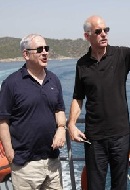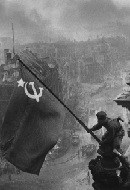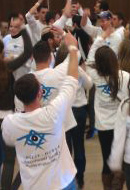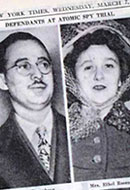People & Places
 A Tale of Two Nation-States
A Tale of Two Nation-StatesFriday, July 15, 2011 by Diana Muir Appelbaum | Jewish Ideas Daily » Daily Features
What made Greece, long a pro-Arab country with a history of anti-Semitism and a notoriously soft line on terrorism, stop political activists from sailing a flotilla to Gaza? What led Greece to rush fire-fighting helicopters to the Mt. Carmel fire?
 The Bible and the Good Life
The Bible and the Good LifeThursday, July 14, 2011 by Aryeh Tepper | Jewish Ideas Daily » Daily Features
What manner of work is the Hebrew Bible? The 17th-century freethinker Baruch (Benedict) Spinoza had an answer. As part of his war to emancipate philosophy from the influence of religion, he reduced the biblical message to, in effect, one word: obedience.
 Through Soviet Jewish Eyes
Through Soviet Jewish EyesWednesday, July 13, 2011 by William Meyers | Jewish Ideas Daily » Daily Features
It is never not depressing: Any tale from the Soviet Union has to be depressing, whether it is conceived of as grotesque folly or simple tragedy, and if Jews are involved, all the more so. Jews are implicated in the creation of the Soviet Union, as its ardent supporters, and, inevitably, as victims of its apparatus of repression.
 The Reluctant Renegade
The Reluctant RenegadeTuesday, July 12, 2011 by Elliot Jager | Jewish Ideas Daily » Daily Features
Since its founding, Conservative Judaism in the U.S. has defined itself in sharp contrast to Reform, pursuing a more religiously centrist and Zionist middle course. Its UK parallel, Masorti ("traditional") Judaism, was born as a secession movement from Orthodoxy—inspired by theologian Louis Jacobs.
 Imaginary Vampires, Imagined Jews
Imaginary Vampires, Imagined JewsMonday, July 11, 2011 by Allan Nadler | Jewish Ideas Daily » Daily Features
1897 was a watershed year in Jewish history. And now, Jewish historians may consider adding a surprising entry to the list of that year's events that proved so repercussive in Jewish history: the publication of Bram Stoker's Dracula.
 A Two-Day Weekend in Israel?
A Two-Day Weekend in Israel?Friday, July 8, 2011 by Elliot Jager | Jewish Ideas Daily » Daily Features
With July 4th behind them, Americans can look forward to closing out the summer season with Labor Day on September 5th. All told, they will enjoy ten national holidays. And, of course, they have the leisure of weekends.
 What is Aggadah, and How to Read It
What is Aggadah, and How to Read ItThursday, July 7, 2011 by Elli Fischer | Jewish Ideas Daily » Daily Features
Although the Talmud is best known for its discourse on religious law, its pages contain a vast amount of non-legal material, including ethical teachings, interpretations of biblical narratives (midrash), and excurses on topics from brain surgery to dream interpretation.
 Getting Birthright Wrong
Getting Birthright WrongWednesday, July 6, 2011 by Philip Getz | Jewish Ideas Daily » Daily Features
In mid-June, The Nation magazine, which for decades has provided a special platform for Jewish critics of Zionism, published an article by a young alumna of Birthright Israel, the organization that since 1999 has sent 260,000 young Diaspora Jews (including this writer) on free ten-day tours of the Holy Land.
 In the Wake of the Altalena
In the Wake of the AltalenaThursday, June 30, 2011 by Elliot Jager | Jewish Ideas Daily » Daily Features
Ships and their comings and goings have lately been a fixation over at Haaretz, Israel's chief left-wing newspaper. One of the paper's advocacy journalists has been writing enthusiastically about joining up with a pro-Palestinian flotilla that intends to smash Israel's naval blockade of the Hamas-controlled Gaza Strip.
 Jews, Communism, and Espionage
Jews, Communism, and EspionageWednesday, June 29, 2011 by Alex Joffe | Jewish Ideas Daily » Daily Features
In the history of the American Left, Jews have been disproportionately represented—disproportionately, that is, relative to their share of the American population. At the extremes, they have also been active participants in what has sentimentally been called the "romance" of American Communism.
Editors' Picks
The Betrayal of Liberalism Hilton Kramer, New Criterion. A chastened American liberalism meets the ‘60s counterculture, in this essay by the critic and founder of the New Criterion who died yesterday at the age of eighty-four. (1998)
Beinart and Bad Faith Bret Stephens, Tablet. The Crisis of Zionism is not a work of political analysis. It is an act of moral solipsism. It shows no understanding that the essence of statesmanship is the weighing of various unpalatable alternatives.
Ghetto Seminaries Fred MacDowell, On the Main Line. No fooling: On April 1, 1906, The New-York Tribune published a long article about the "Jewish boys who risk health by long study in foul rooms"—including the heder that would become Yeshiva University.
Village of Idiots Matti Friedman, Times of Israel. While the fables of Chelm have come to be seen as products of a quintessentially Jewish culture, their history begins not with Jews in Poland, but with Christians in Germany.
The Writing on the Synagogue Wall Shmuly Yanklowitz, Forward. James Kugel warned of the "Ceremonial Hall Synagogue," the "Nostalgia Center," and the "Davening Club." Are we witnessing the demise of the synagogue—and should we try to save it?
Dovecoattails Alex Klein, Tablet. "Can you build an organization which is an alternative and not attract all the haters of Israel?" Forty years ago, the pressure group Breira tried it—and J Street's director is hoping the comparison works in his organization's favor.
The Dreyfus of Classical Music Benjamin Ivry, Forward. Once vilified by Schumann and Wagner for not being German enough, now Giacomo Meyerbeer's music is criticized for not being Jewish enough.
Eric Kandel's Visions Alexander C. Kafka, Chronicle of Higher Education. Why is the Nobel-winning neuroscientist who's spent most of his career fixated on sea snails writing on art history? It may have a lot to do with his background as a Viennese Jew . . .
Together We Stand Bernard-Henri Lévy, Haaretz. In the wake of the murders in Toulouse, all of France must stand united against anti-Semitism, which is an attack on the republican ideals which all of France holds dear.
French Al-Qaeda MEMRI. Muhammad Merah, who has confessed to perpetrating the murders in Toulouse, appears to be a member of Fursan al-'Izza, the French branch of Al-Qaeda, profiled here.

